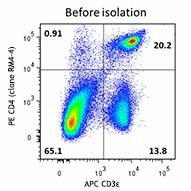- Regulatory Status
- RUO

-

A single cell suspension from pooled C57BL/6 mouse lymphoid tissues was prepared to isolate CD4+ T cells using the MojoSort™ Mouse CD4 T Cell Isolation Kit. Cells were stained with CD4 (clone RM4-4) PE and CD3ε (145-2C11) APC. -

| Cat # | Size | Price | Quantity Check Availability | ||
|---|---|---|---|---|---|
| 480005 | 10 tests | $113.00 | |||
| 480006 | 100 tests | $483.00 | |||
| 480033 | 200 tests | $654.00 | |||
Non CD4+ T cells are depleted by incubating your sample with the biotin antibody cocktail followed by incubation with magnetic Streptavidin Nanobeads. The magnetically labeled fraction is retained by the use of a magnetic separator. The untouched CD4+ T cells are collected by decanting the liquid in a clean tube. These are your cells of interest; do not discard the liquid. Some of the downstream applications include functional assays, gene expression, phenotypic characterization, etc.
MojoSort™ reagents are also compatible with column-based cell separation systems available from other vendors. Optimized protocols for cell separation using columns from in-house testing are provided for each kit under the “Related Protocols” section, as well as representative data on the product webpage (where available). Data generated using column separators are indicated on the figure legend.
Due to the property of the beads, MojoSort™ reagents typically require dilution for optimal use on column separators. Where available, recommended dilution factors for each kit component based on in-house testing are provided under the “Application Notes” section of the webpage.
Kit Contents
- Kit Contents
-
For Cat# 480005:
- 100 µl Biotin-Antibody Cocktail
- 100 µl Streptavidin Nanobeads
For Cat# 480006:
- 1 ml Biotin-Antibody Cocktail
- 1 ml Streptavidin Nanobeads
For Cat# 480033:
- 2 vials of 1 ml Biotin-Antibody Cocktail each
- 2 vials of 1 ml Streptavidin Nanobeads each
Product Details
- Verified Reactivity
- Mouse
- Formulation
-
Cocktail: Phosphate-buffered solution containing 0.09% sodium azide, pH 7.2.
Streptavidin Nanobeads: Aqueous solution containing BSA and 0.05% sodium azide. - Preparation
-
The antibodies were purified by affinity chromatography, and conjugated with biotin under optimal conditions.
Streptavidin Nanobeads: Streptavidin-coated magnetic beads. - Storage & Handling
- Antibody cocktail and Streptavidin Nanobeads should be stored undiluted between 2°C and 8°C.
- Application
-
Cell Separation (MojoSort™) - Quality tested
- Recommended Usage
-
10 µl of antibody cocktail for 1 X 107 cells in 100 µl of buffer.
10 µl Streptavidin Nanobeads for 1 X 107 cells in 100 µl of buffer. - Application Notes
-
This kit is designed for the isolation of untouched CD4+ T cells from lymphoid tissues.
Each lot has been individually optimized. Do not mix and match components from different lots or different kits.
Antibody or cocktail dilution to use in column: 8X
Nanobead dilution to use in columns: 9X -
Application References
(PubMed link indicates BioLegend citation) -
- Dong L, et al. 2016. Sci. Rep. 6:36598. (PubMed)
- Product Citations
-
Antigen Details
- Biology Area
- Immunology
- Molecular Family
- CD Molecules
- Gene ID
- NA
- UniProt
- View information about CD4 on UniProt.org
